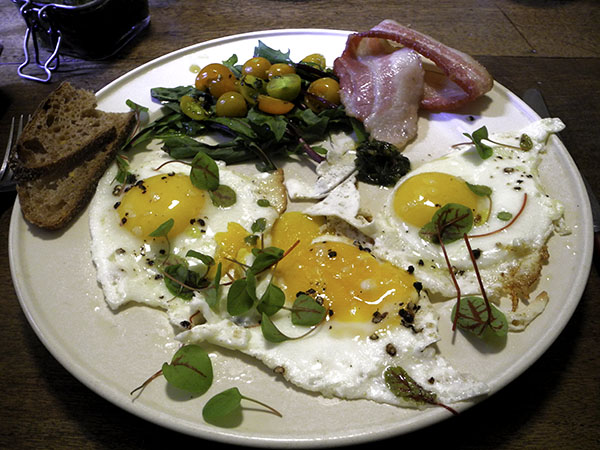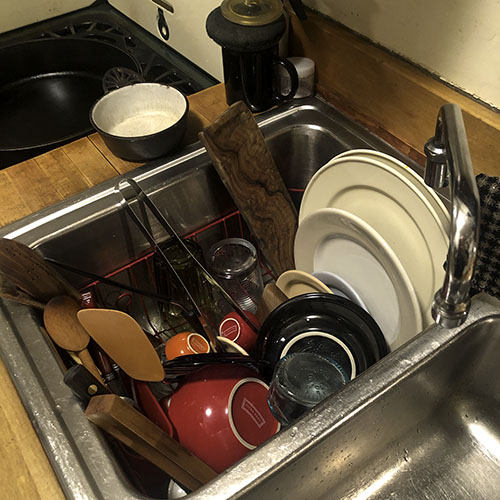
It was good.
Although it was a little simpler than many of these mid afternoon ‘fast breakers’, so I had at least metaphorically brought fewer things to the table. There were still a lot of containers however but fortunately I actually enjoy washing up afterward, and have never had a dishwasher, or even wanted one.
This is what the drainer looked like after this relatively simple lunch.

- on the table earlier: 4 slices of thick bacon from pastured pigs and 6 fresh eggs from pastured chickens, all from the Amish family-run Millport Dairy Farm stand in the Union Square Greenmarket, the eggs seasoned with a local Long Island sea salt (from P.E. & D.D. Seafood) and freshly ground black pepper, drizzled with a tiny amount of Brazil wax pepper-infused olive oil (the peppers from Eckerton Hill Farm, the infusion done at home), and sprinkled with red vein micro sorrel from Two Guys from Woodbridge, with a dollop of the cook’s own homemade Zhug at the side; there was a small salad of red dandelions leaves from Willow Wisp Farm seasoned with salt and pepper, and a good Cretan (Chania) olive oil, Renieris Estate ‘Divina’ (a Koroneiki varietal), from Chelsea Whole Foods Market, topped with a few differently toned cherry tomatoes from Norwich Meadows Farm that had been halved and heated in a little While Foods house Portuguese olive oil inside an antique enameled cast iron porringer and tossed with chopped thyme leaves from Quarton Farm; a rich local butter (Organic Valley ‘Cultured Pasture Butter’ from Chelsea Whole Foods, and 2 breads, both from Lost Bread Co., neither toasted, a Homadama (wheat, corn, water, maple syrup, salt, slaked lime) and a Buck Honey Rye (rye, malted buckwheat groats, honey, water, salt)
- the music was the 1871-1872 oratorio, ‘Luther in Worms’, by the choral director, critic, and composer Ludwig Meinardus, performed by Hermann Max directing Concerto Köln and the Rheinische Kantorei (neither Martin Luther nor the composer’s conservative Protestantism appeal to either of us, but the subject of the piece and the conservative romantic composition itself occupy niches in history that interest both of us; Barry came across this recording and used it to fill the niche we generally reserve for religious music first thing on Sundays, a tradition in spite of, or possibly because of, the depth of our shared disbelief